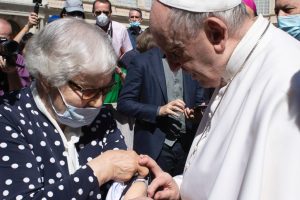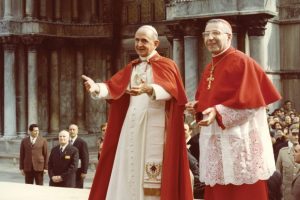Attending Mass with young kids is much harder than it seems, and when Children’s Liturgy of the Word (CLOW) closed at my parish due to the COVID-19 pandemic, it was even harder. Much ink has been spilled begging fellow parishioners to look mercifully upon families like ours as we try to keep our children calm and quiet, never mind attentive, for the entire hour. When our parish started to open things up again as pandemic restrictions eased, I called the director of religious education and asked if I could help bring back CLOW. As an ecofeminist theologian, I never thought I’d teach catechesis. But desperate times call for desperate measures, so I began.
I went through catechetical training myself not so long ago, when I converted to Catholicism during graduate school. The integration of truth and beauty, faith and intellectual rigor, captured my spiritual imagination and drew me to the church. As I studied St. Augustine’s Confessions and dug into the Compendium for Catholic Social Thought, the horizons of my moral worldview expanded, and I began to see the world through a more humanistic, relational lens.
But the more I explored, the more I discovered that the Catholic tradition has been too often distorted by patriarchal constructs—truth too often diminished to an idol made in the image of white and Western men; faith too often demanding unquestioning subservience by the oppressed. Women and—by extension of the same patriarchal constructs—people of color, LGBTQ people, and the Earth, more broadly, have been ignored or silenced throughout church history, and I am convinced that perpetuating this marginalization stifles the creative movement of the Spirit.
I have learned to characterize this kind of analysis as ecofeminist theology, which involves imagining and articulating our tradition in ways that are affirming and inclusive—remaining faithful to Christ’s prayer “that all may be one.” Importantly, these insights developed in me as I served in justice and peace work with a community of women religious—an experience that nurtured seeds emerging from my catechetical training and study of St. Augustine (who, incidentally, is the most-referenced theologian in the catechism). Thus, I do not see ecofeminism as running counter to the Catholic tradition—I see it as logically flowing with the core tenets of our faith. “To do theology rightly,” Catholic nun and Brazilian ecofeminist theologian Ivone Gebara reminds us, “is tenderly to touch the mystery of divinity present in man and woman. . . . It also means changing somewhat a hierarchy of patriarchal values that has left a strong imprint on our theology and our churches.”
Patriarchal values include everything that pits men against women, or humans against nature. For example, using exclusively male pronouns for God (and humans, for that matter) promotes a male patriarchal God and reinforces the idea that humans image God through maleness—the supposed pinnacle of intellect, which includes but surpasses the (supposedly feminine) body in the hierarchy of being. To be the body of Christ, we must image God, not the other way around.
This critique is nothing new. There is no dearth of prophetic Catholic voices (not to mention Indigenous and non-Western traditions) critical of the image of God idolized by the institutional church, calling the church toward more inclusivity, more humility, more justice, more love. Servant of God Sister Thea Bowman, Dorothy Day, and St. Óscar Romero come readily to mind as recent examples. Unfortunately, such voices are too often overlooked or characterized as dissident. But, as Gebara argues, in our faith “there is no room for male-centeredness or any kind of dualism, since any kind of anthropological or theological reductionism cedes to the confession of faith that the Word became flesh in human flesh, flesh of man and woman, in the actuality of history and within its limits.”
Given that human flesh contains elements of stardust from the beginning of time, shared with plants and animals the world over, the incarnation demands that we expand the horizons of our faith. In practical terms, this is a call to dismantle those hierarchies that have been formed according to a Western patriarchal paradigm and to nurture embodied relationships instead. Participating in this endeavor is not only faithful to our Catholic tradition but essential for handing on the faith to the next generations.
As a catechist, however, I am responsible for passing on the tradition exactly as it has been handed down, patriarchal warts and all. For example, sometimes I am asked to teach prayers that refer to God in exclusively male pronouns or to celebrate stories of saints who brought the gospel to Indigenous peoples, sanctioned by the Doctrine of Discovery. This is a difficult tension. I worry that I am compromising my integrity, contributing to ongoing oppression, or pushing little ones away from the church.
These worries are not unfounded. I teach a course at Georgetown University called “The Problem of God,” which is a required first-year course that explores different manifestations and expressions of the human search for God. With Augustine’s Confessions as our guide, my students and I reflect on our spiritual journeys. Amid the diverse experiences, it is easy to spot a common element: The majority of students grew up Catholic but have rejected the institutional church. Or, perhaps it is better to say that they feel the institutional church has rejected them. Overwhelmingly, the reasons they offer include disgust with the hierarchical and patriarchal structures, the exclusion of the LGBTQ community, and the perceived suppression of critical thinking. The church taught love and respect, they acknowledge, but they’ve become disillusioned with its dominative attempts to enforce patriarchal interpretations of that ideal.
Writer and activist adrienne maree brown insightfully recognizes that people who are newly aware of injustice can be the most condemnatory when they observe others still mired in problematic ways of thinking. She worries that “people [are] starting to skip the step of actually decolonizing and unlearning these oppressive systems and just being like, ‘I’ll just punish anyone who missteps.’ ” Her worry hits home. I never would have been as sensitive to injustice had I not been formed by the sacraments to participate in the body of Christ, just as many of my college students recognize that their Catholic moral formation was instrumental in their disenchantment with the tradition. The Catholic tradition offers a beautiful language for expressing faith and connecting to what is sacred; to deprive children of this means of expression cannot be the answer to critiquing injustice. Rather, inviting them into dialogue and helping them learn to dig deeper into the meanings of our prayers and rituals can be a way to open up a richer appreciation of the faith. Faith is a journey, and only when we are walking the path can we question whether it needs to be repaved.
It is helpful to me to remember that when St. Augustine himself was drawn to the church, it was in large part due to the influence of a teacher (St. Ambrose) who encouraged his questions and exposed the rich layers of meaning to be gleaned from scripture—even as he observed that the simplicity of truth could be accessed by anyone, at any level. Elements of faith that Augustine eschewed when he took them at face value became sources of wisdom when he learned to reimagine their meaning—and this also led him to new questions. I am convinced that now, as a catechist, it is my primary duty to be that kind of teacher and to invite students to dive deeper into their faith and imagine those elements that expand rather than stifle the search for God.
So, when I teach children’s liturgy, I affirm the importance of questioning, of listening to diverse voices that are essential to our Catholic tradition, and of remaining open and attuned to the movement of the Spirit. I emphasize the underlying framework that is the absolute foundation of our faith: the embodied love of God. I hope these seeds will grow into faith that acts justly, seeks mercy, and walks humbly. In the meantime, I walk the line of theology and catechesis, pray for wisdom and humility, and discover God in the simple faith of little ones, which reflects the simple love that is the heart of the universe.
This article also appears in the June 2023 issue of U.S. Catholic (Vol. 88, No. 6, pages 23-25). Click here to subscribe to the magazine.
Image: iStock.com/monkeybusinessimages













Add comment